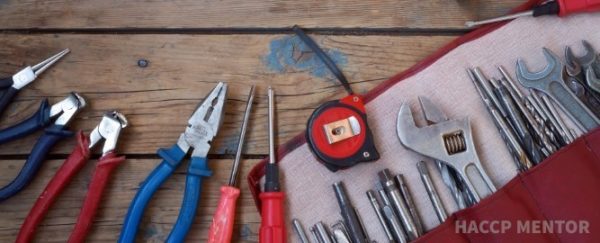Maintenance contractors can be a source of contamination in your food business. Because they are not employees, they may be overlooked in your food safety management strategies. In this post, we are going to review easy ways to control the risk of your maintenance contractors.
Before we get into my tips on controlling maintenance contractors, let’s first define what is a maintenance contractor. It is someone who is hired to complete a specific maintenance project or task. This person is not an employee, but hired as an independent business.
Tips for controlling maintenance contractors
Now, you may be thinking, why do we need to control maintenance contractors that visit our food business? Simple answer – because they can be a potential risk to our food product. Potential contamination can arise directly from their activities. This can include fixing food production equipment to the machine lubricates they use during their maintenance activities. Here are my top five (5) tips to implement in your food business.
1. Individual personal hygiene
Just because the maintenance contractor is not an employee of your food business, they are still required to comply with good personal hygiene and general GMP rules. This includes wearing suitable head covering, removing jewellery and thoroughly washing their hands. You can make personal hygiene requirements available during your maintenance contractor induction process.
2. Controlling tools
During a recent audit of one of my clients, a maintenance contractor was found to have a toolbox that resembled a fair mush-up. The outer case was filthy and the contents of the tool-box were unorganised and uncontrolled. To help avoid any potential contamination, you can implement strict procedures on the content and cleanliness of the maintenance contractors tool-box.
3. Post activity hand-over
After any type of maintenance activity, there should be some type of hand-over inspection. This is where you check the cleanliness of the machine and area where the maintenance was performed and also if there are any remaining tools or debris.
4. Allergens in lubricants
The machine lubricants used by maintenance contractors should be assessed prior to use to determine if there are any allergens present. One of the most common allergens present in chemical lubricants is soy. Peanut oil has also been identified as being used as well. Take the opportunity to complete a mini-audit on the allergen status of all machinery lubricants used in your food business.
5. Food Grade status of lubricants
The majority of GFSI standards and legislation around the world will reference the need to use ‘food grade’ lubricants when there may be incidental contact with food. Like the allergens in lubricants section, you should also take the opportunity to complete a mini-audit on the food grade status of maintenance lubricants in use.
What do you do?
I have only touched on a few ways to control your maintenance contractors. Share with the HACCP Mentor community strategies that you have implemented in your food business to address preventing contamination from maintenance activities.


This has never come to my mind before, just about to do some renovation in the kitchen and I came along this article, such a great help. Thanks Mentor for bringing this up. I will do all the necessary checks and monitoring.
Glad you found it helpful Amir
Indeed…outside contractors could be an indirect source of contamination as they usually don’t care or are unaware of all the safety controls that a food facility has in place an even if they are explained to them monitoring is a must….
Absolutely Francisco. It is very important to make sure adequate education is in place for outside contractors.
Good morning Mentor,
Your post is very important. I think the pre-qualification of maintenance companies is an important step. Specifying hygiene procedures, maneuvers employed, tools, used products, etc., for this type provider is paramount.
Pre-qualification of maintenance companies is a great suggestion Paulo. Thanks for sharing.
Hi
I think an induction for site requirements is mandatory so that its crystal clear on what the business expectations are (this could/should be discussed prior to them coming to the site so expectations are clearly understood . There also needs to be clear guidelines on who oversees the process including being their escort and follow-up checks on them (if they aren’t working alongside that person).
Them bringing tools on-site also poses risk on cleanliness, where they were last used, residues/allergens etc., some careful thought needs to be put into this as well.
Cheers
Rod
Thanks for this Rod – great feedback. I totally agree that adequate supervision needs to be in place when external contractors are onsite.
Its really great , i face a lot of problems in the site from contractors GMP violations the major thing is drinking juice as am working in Dairy and juice facility and they hide the empty packages in un predicted places.
Thanks Maged. You would think that as adults, people would at least use a garbage bin!
Hi Manda,
This is indeed great insight of what is missing in our organisation in our quest to become world class in all our activities.
thanks
James
Thanks James. I think we get so busy with doing everything else in our food business that sometimes we can forget the basics.